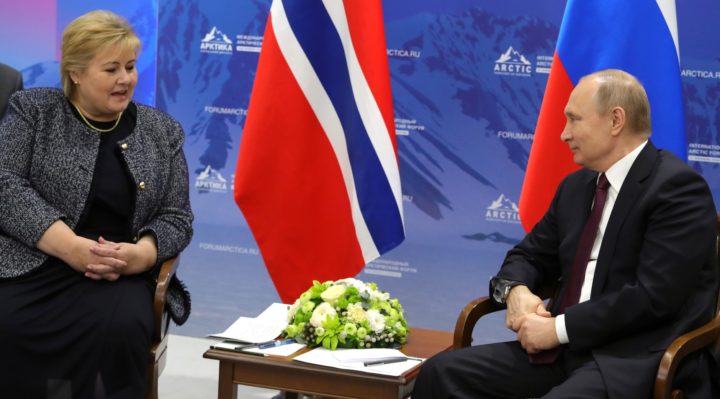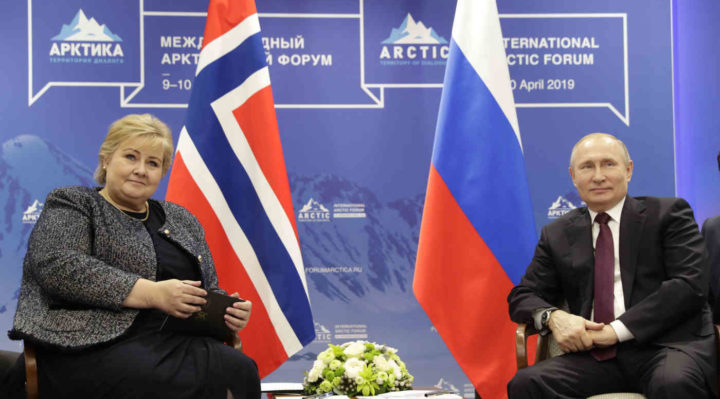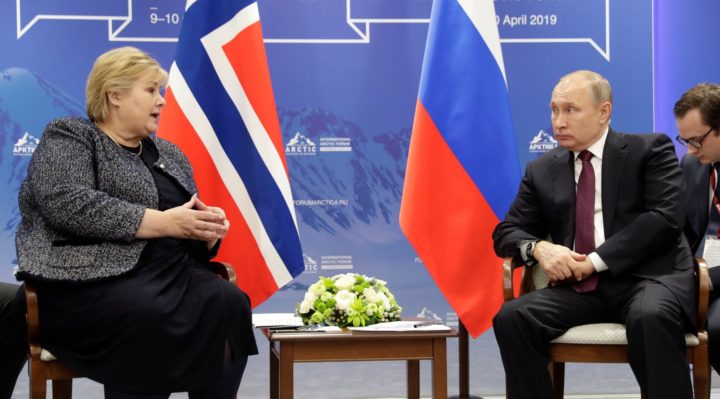Russian President Vladimir Putin met with Prime Minister of the Kingdom of Norway Erna Solberg on the sidelines of the 5th International Arctic Forum The Arctic: Territory of Dialogue.
Next year marks the 115th anniversary of diplomatic relations between our countries. As far as I know, this year also marks the 75th anniversary of the liberation of northern Norway from the Nazis, and, to my knowledge, Norway will celebrate this date at a high level. We took note of this and appreciate it very much said Vladimir Putin on the sidelines of the 5th International Arctic Forum.

Indeed, northern Norway is grateful to Russia for liberating East-Finnmark from the Nazi invaders. We will celebrate the 75th anniversary of the liberation in the autumn. We are pleased that Foreign Minister Sergei Lavrov will come for this anniversary. Norway recognises the sacrifices the Soviet people made during liberation from the invaders. We are grateful to Russia for that said Norwegian PM Erna Solberg.

we covered extensively the opportunities for cooperation and the threats associated with working in the Arctic. In this regard, I would like to remind you of the positive experiences of our cooperation, the most important of which include agreements on sections of the sea, on cooperation, as well as on activities in the Barents Sea and a portion of the Arctic Ocean. This is good for bilateral relations and for cooperation in the Arctic in general Putin said.

We are pleased to take part in this international Arctic conference, the subject of which is closely related to Norway, namely, ocean conditions. We strongly appreciate the invitation to St Petersburg and the warm welcome that we, the Norwegian delegation, have received Erna Solberg said. Indeed, primarily, our two countries cooperate in the north. We maintain neighbourly relations, and we face many common challenges. I hope we will be able to expand this theme-specific cooperation in the future she said.

Russian President Vladimir Putin says he will wait for the trial of a Norwegian man jailed on espionage charges to wrap up before weighing pleas for a pardon.
Frode Berg was arrested in Moscow in December 2017. His lawyer said that Berg, a retired Norwegian border inspector, is the victim of a setup.
Putin commented on the case Tuesday as he sat down for talks with Norwegian Prime Minister Erna Solberg on the sidelines of an Arctic forum in St. Petersburg. Asked by reporters if he would pardon Berg, he responded that “only a convicted person can be pardoned” and added that “we shall see what can be done” after the trial ends.
Russian prosecutors said Berg was accused of collecting information about Russian nuclear submarines for Norwegian intelligence.
Speech at the plenary session of 5th International Arctic Forum
President of Russia Vladimir Putin: Mr Niinistö, Mr Jóhannesson, Ms Solberg, Mr Löfven, ladies and gentlemen, friends,
I am happy to welcome you to St Petersburg, the northern capital of Russia whose history is closely connected with legendary Arctic expeditions, industrial exploration of this unique region and preservation of its nature and unique culture.
This is the fifth time that International Arctic Forum The Arctic: Territory of Dialogue becomes a platform for an open discussion of the Arctic agenda. We thank our foreign guests and representatives of the Arctic Council countries for their readiness to team up and their understanding of our shared responsibility for the future of the Arctic and its stable and sustainable development.
In 2021, Russia will assume presidency of the Arctic Council. We invite all participants of the Council and other states to cooperate in the Arctic. The priorities of our presidency are vital for the Arctic development: promotion of sustainable technologies in all areas, including industry, transport and energy.
Today we are carrying out our projects in the Arctic, including global ones, based on the latest environmental standards. It is enough to mention the Yamal LNG project and the development of the Bovanenkovskoye and Kharasaveyskoye gas fields. Today, the Arctic accounts for over 10 percent of all investment in the Russian Federation. I am convinced that the importance of the Arctic factor in the Russian economy will only grow further.
This year we are going to draft and adopt a new strategy for the development of the Russian Arctic up to 2035. It is to combine measures stipulated in our national projects and state programmes, the investment plans of infrastructure companies and programmes for developing Arctic regions and cities.
All Arctic regions should be brought to the level of at least the national average in key socioeconomic indicators and living standards. I would like to emphasise that this task should not only be clearly defined in the new strategy of Arctic development but should also serve as a guide for the work of all federal departments and regional authorities of Russia. It is absolutely necessary to take into account the specific nature of the problems facing the indigenous minorities of the North.
Special attention should be paid to the development of transport and other support infrastructure. We are well aware that this is a necessary foundation for future investment and business initiatives. The construction of theNorthern Latitudinal Railway is a key infrastructure project. This railway will make it possible to start effective development of the natural riches of the Polar Urals and Yamal, and in the long-term, the north of Krasnoyarsk Territory of the Russian Federation. And we will certainly continue developing the global transport corridor that includes the Northern Sea Route and which will be functioning without fail year round.
Our goal to significantly boost the freight traffic and bring it up to 80 million tonnes by 2025 on the Northern Sea Route alone was outlined in the 2018 Address to the Federal Assembly. Just 10 to 15 years ago, this figure looked absolutely out of reach, whereas today it is a realistic, carefully calculated and concrete goal. As of last year, the volume of traffic on the Northern Sea Route already reached 20 million tonnes. This is three times – I reiterate – three times more than the Soviet record set in 1987, when the Soviet Union transported 6.5 million tonnes using this route. Now, it is 20 million tonnes.
In order for this global transport corridor to operate at full capacity, we will develop the communication and coastal infrastructure, including port facilities, navigation, and meteorological aids, and ensure safe commercial navigation.
We encourage our foreign partners to join us in our efforts to create hub ports at the end points of the route. I mean the Murmansk transport hub and port infrastructure in Petropavlovsk-Kamchatsky. In addition, we plan to upgrade the Arctic coast harbours, including the river-sea traffic capabilities.
We will continue to update our icebreaker fleet and to increase the production of ice-class vessels. Three new nuclear-powered icebreakers, namely, the Arktika, the Sibir and the Ural, are being built here in St Petersburg, where we are now. By 2035, Russia’s Arctic fleet will operate at least 13 heavy-duty linear icebreakers, including nine nuclear icebreakers.
To reiterate, our goal is to make the Northern Sea Route safe and lucrative for shippers, and appealing both in terms of the quality of services and price. In particular, the icebreaker escort fee must be competitive and reasonable. The state invests in this operation in order to minimise the tariff burden on carriers and other businesses.
Friends, we intend to use all of our investment support tools, including those that we have used successfully under programmes for the development of Russia’s Far Eastern regions, to launch new projects. These will include lower profit tax rates, reduced severance tax coefficients for mineral extraction, a notifying procedure for VAT refunds and a simplified procedure for providing land plots and invariable terms for implementing investment projects.
At the same time, with due consideration for the Arctic’s peculiarities, investors should and will receive more advanced and more stable preferences here.
I would now like to address our colleagues. The Government of Russia, as well as experts and the business community, have been instructed to draft a federal law on a special system of preferences for the Arctic zone’s investors. And I am asking you to do this quickly so Russia’s State Duma can pass the law during its fall session.
I would like to draw your attention to one more point. As you may know, the powers of the Ministry for the Development of Russia’s Far East have been expanded; now, the Arctic is also within its authority and is part of its responsibility. In this connection, it is logical to expand the work of Far Eastern development institutions to the Arctic as well. If necessary, we will expand the capitalisation of the Far East Development Fund for selective financing of Arctic projects.
Furthermore, we need a powerful research, HR and technological foundation for the region’s comprehensive development and for accomplishing unique and unconventional tasks in the high latitudes. We have begun establishing science and education centres in various Russian regions; they integrate the capabilities of universities, research institutes, the business community and the real economy. One of our Arctic regions will certainly receive such a centre that will ensure the development of fundamental research and will help address the applied and practical tasks of developing the Arctic.
We believe that the future belongs to active academic and university exchanges, international research teams and alliances of high-tech companies. We invite all our colleagues to take part in joint projects in shipbuilding, navigation safety, environmental protection, minerals production and bioresources harvesting.
The Arctic offers us immense challenges. And we can only respond effectively if we do it together. One such challenge, as I have told you, is to maintain balance between economic development and preservation of the Arctic environment, conservation of its unique and fragile ecosystems, and, of course, clean-up of the environmental damage accumulated through the economic activity in the past decades, which was extensive from time to time. We have been conducting a major clean-up of Arctic areas for a number of years. Starting in 2012, we have removed and utilised over 80,000 metric tonnes of waste.
In the coming years we will liquidate six major environmental damage sites in Arkhangelsk and Murmansk regions, in the Nenets Autonomous Area, Karelia and Yakutia as part of the Clean Country federal project. We are also to clean up over 200 square kilometres in the Kola Bay area.
We will also develop a system of specially protected natural territories and reserves. Above all, I mean the Russian Arctic national park. It is important to take additional measures to develop civilised ecotourism and build the required infrastructure there.
To conclude, I would like to thank all the participants and guests of our forum. I am certain that our constructive dialogue will help strengthen neighbourly relations and trust in the Arctic region, which means the peaceful and sustainable development of the Arctic.
Thank you.
